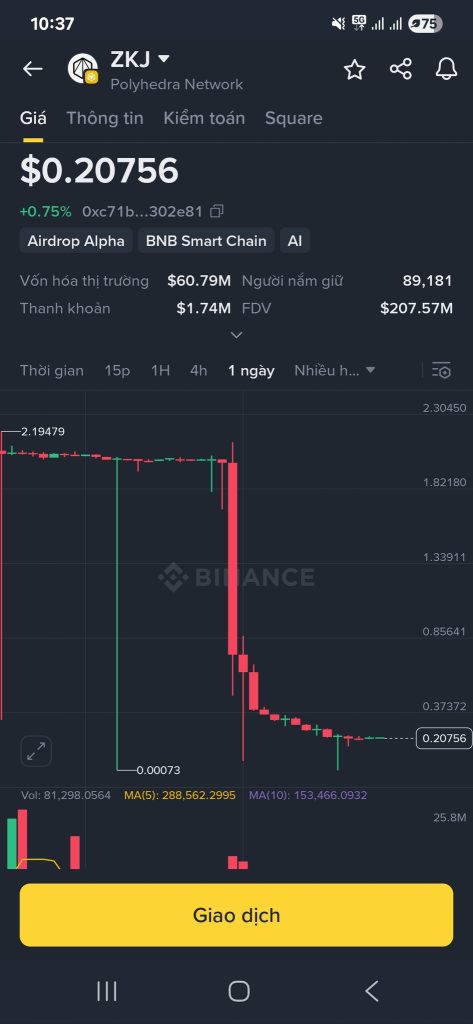Background
Polyhedra Network, supported by Binance Labs, focuses on zero-knowledge proof technology for Web3. However, its token $ZKJ crashed over 80% on June 15, 2025, raising concerns about its credibility.
What Happened
On June 15, 2025, $ZKJ dropped from around $2 to below $0.30 in hours, losing over $360 million in market value
Binance Labs’ Role
Being backed by Binance Labs (now YZi Labs) is a positive sign, as they’ve invested in over 200 projects. But recent events, like large token dumps and community accusations on X, have shaken trust .
Should You Trust It?
While Binance Labs adds credibility, it doesn’t guarantee the project won’t face issues. The crash and lack of transparency suggest caution. If you’re thinking of investing, do your own research and only risk what you can afford to lose.

A Detailed Analysis of Polyhedra Network’s Credibility with Binance Labs Backing
Introduction
Polyhedra Network, a project focused on zero-knowledge proof (ZKP) technology for Web3 interoperability, has garnered attention due to its backing by Binance Labs (now known as YZi Labs), a prominent venture capital arm in the crypto space. However, recent events, particularly the dramatic crash of its token $ZKJ on June 15, 2025, have raised questions about its credibility. This report, as of 10:25 AM +07 on Wednesday, June 25, 2025, provides a comprehensive analysis of whether being backed by Binance Labs guarantees trustworthiness, especially in light of allegations of a potential rugpull.
Background on Polyhedra Network and Binance Labs
Polyhedra Network aims to enhance scalability, privacy, and interoperability in blockchain systems through ZKP technology, with its flagship product, zkBridge, facilitating cross-chain interactions .
Binance Labs, now operating independently as YZi Labs, has a reputation for selecting projects with strong fundamentals, with over 70% of its backed projects achieving Binance listings within a month post-token generation event (TGE) . This support often includes not just capital but also technical and marketing assistance, enhancing project visibility and liquidity.
Recent Events and Allegations
On June 15, 2025, $ZKJ experienced a catastrophic price drop, losing over 80% of its value in under an hour, reducing its market cap by more than $360 million
. This event triggered widespread speculation of a rugpull, a scenario where a project’s team abandons it and removes liquidity, leaving investors with worthless tokens. Evidence supporting this includes:
- On-chain Activity: Before the crash, approximately $40 million in $ZKJ was transferred to anonymous wallets, and six whale wallets sold 5.23 million tokens for $9.66 million, suggesting possible insider selling.
- Liquidity Withdrawals: Binance confirmed large liquidity providers withdrew, contributing to the crash.
- Community Reaction: Numerous X posts accused the team of rugpulling. For instance, an X post by @AkaBull_ on June 15, 2025, claimed the team used multiple wallets to dump tokens, causing a 90% price drop .
Polyhedra Network’s Response
Polyhedra Network has denied rugpull allegations, attributing the crash to a “liquidity attack” by malicious actors. They cited factors like large Wintermute deposits and forced liquidations, wiping out $500 million in market value
. However, their lack of transparency and detailed explanations has not fully quelled community doubts.
Analysis of Credibility
While Binance Labs’ involvement is a strong endorsement, it does not guarantee a project’s integrity. The crypto market is volatile, and even well-backed projects can face issues due to mismanagement, market conditions, or external attacks. Historical examples, such as rugpulls on Binance Smart Chain (e.g., Turtledex in 2021, which raised $2.5 million before rugpulling ), show that proximity to Binance does not eliminate risks. However, these cases were not directly backed by Binance Labs, suggesting their due diligence process is typically robust.
The following table summarizes key factors influencing Polyhedra Network’s credibility:
| Factor | Details | Impact on Credibility |
|---|---|---|
| Binance Labs Backing | Raised $10M in 2023, co-led by Binance Labs, Polychain Capital | Positive, adds initial trust |
| Recent Token Crash | $ZKJ dropped 80% on June 15, 2025, losing $360M market cap | Negative, raises rugpull fears |
| On-chain Evidence | $40M transferred to anonymous wallets, whale dumps | Negative, suggests insider sell |
| Official Response | Blames liquidity attack, announces buyback plan, injects $30M liquidity | Mixed, lacks transparency |
| Community Reaction | X posts accuse rugpull, significant loss of trust | Negative, impacts perception |
Implications for Investors
For investors, the backing by Binance Labs is a positive signal but not a foolproof guarantee. The recent events with Polyhedra Network highlight the importance of due diligence, including reviewing the project’s whitepaper, team background, and community sentiment. Monitoring updates from official channels and tracking market conditions is crucial. Given the controversy, investors should consider diversifying their portfolios and only investing what they can afford to lose, especially in volatile projects like $ZKJ.
Conclusion
Research suggests that while Polyhedra Network’s backing by Binance Labs adds credibility, the evidence leans toward potential mismanagement or even a rugpull, given the token crash and community backlash. It seems likely that Binance Labs’ support enhances initial trust, but investors must remain cautious, as the project’s recent actions have not fully restored confidence. Continuous monitoring and thorough research are essential in navigating such controversies.
Key Citations
- Polyhedra Network Raises $10M for Zero-Knowledge Infrastructure
- Polyhedra Network’s ZKJ Crashes 60% Amid Liquidity Crisis
- Binance Labs Portfolio
- Polyhedra blames ZKJ token crash on liquidity pull, CEX dumps
- Polyhedra Blames Liquidity Attacks, Promises Buybacks, Days After Sudden 80% Price Drop
- Polyhedra Network’s ZKJ token crashes over 80% after Binance Alpha LPs reportedly pull liquidity
- Polyhedra Network official website
- Polyhedra Network Blog
- Another Binance Smart Chain Project Turtledex Rug Pulls
- Top 5 Pre-TGE Projects Backed by YZi Labs
- X post by AkaBull_ on Polyhedra Network $ZKJ crash
- X post by 0xosyro on $ZKJ crash analysis
- X post by CryptoKing4Ever on $ZKJ dump
- X post by DeFiTracer on Polyhedra team dump
- X post by cryptobeastreal on $ZKJ rugpull
- Here’s why Polyhedra (ZKJ) crashed over 80% in an hour
- Polyhedra Network Blames “Liquidity Attack” for ZKJ Token Crash


